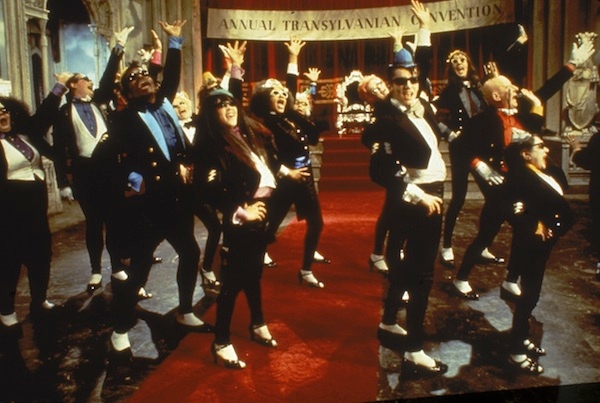‘If we don’t like modern Britain, then it is very unlikely that modern Britain will like us’ says Damian Green, in a piece for the Daily Telegraph today. I’m not sure if this is a piece of pre-reshuffle positioning or a cri de coeur, but his analysis is about ten years out of date. Green is not a Notting Hill Tory, he’s part of the group whom Rachel Sylvester once described as the ‘Blueberry Hill’ Tories — a generation born about the same time as the Fats Domino hit, who got into parliament early enough to see their party spanked by Tony Blair in three general elections. This gave rise to the ‘modernisers’, whose analysis was right for the time. But now, this group seem to be focused on providing ever-better ways to win the 2001 election. Very little of this is likely to help the Tories in 2015.
Green challenges the Tories to pass the ‘Danny Boyle’ test, which is an new way of phrasing a new argument: that Britain is multi-racial, socially liberal, a quarter of kids are brought up by single mothers nowadays so the Tories ought to come to terms with this, and stop yearning for a better yesterday. I quite agree, but why does he have to raise the point? The Tory Party has moved on, as witnessed by a new generation of MPs who are utterly uninterested in all of this. James Forsyth profiled the new Tory radicals, in a definitive cover piece. If you were to list the most prominent of the Free Enterprise Group of MPs you’d have Dominic Raab, Priti Patel, Liz Truss, Margot James, Kwasi Kwarteng, Jesse Norman and Sajid Javid . (Any time Coffee Housers get depressed about the state of the Tory party, I’d recommend looking these guys up: their speeches, their pamphlets, their arguments).
If I had to list the top ten Tories whom I most admire, I’d include many of the above MPs. Something tells me that they do not spend much time worrying about whether they would pass the Danny Boyle test — and more time worrying about the government’s rate of progress. The modernizing movement made very good and (at the time) necessary points, similar to those Angus Maude made in 1969. It was time to drop the economic stuff, and focus on social issues instead. At the time, it was to have a party whose MPs better reflected modern Britain. The 2010 intake are the most promising Tories in a generation, a fusion of meritocracy and diversity. Recruiting these young MPs is one of David Cameron’s greatest achievements as party leader. Most of all, they have not spent their adult lives around SW1 so are not hung up on past battles.
A good deal of Britons are concerned about immigration and are (unlike most politicians) quite capable of separating this from concerns about race or culture or Danny Boyle. As I argued last week, the number of foreign-born workers in employment is rising at 500 a day, twice as fast as the number of British-born workers in employment. You don’t have to be Enoch Powell to suspect that this indicates something not quite right in the labour market. And the old Labour voters concerned about immigration in Bradford and Dagenham simply ask how the schools, GPs clinics and council houses etc are going to cope with this influx of people. Such concerns are practical, not racial. In his article Green doesn’t mention how much progress he’s making in his given mission of reducing immigration to under 100,000. The answer is that net immigration has risen to 250,000 a year, with another lack-of-progress report due from the ONS later this week. The target was thoughtless and utterly unachievable, and Green would never have advocated it. But he’s lumbered with it nonetheless. And unfortunately for him, voters do tend to judge ministers on their ability to do what they say they’ll do.
Green is amiable, thoughtful and the very opposite of a Blunkett-style ‘we’re getting swamped!’ minister. But in the article, he’s fighting the last war. The headline to Green’s piece said that ‘the Tories have to pass the Danny Boyle test’ (if they want to win an election). I’d say that certain Tories need to stop thinking about politics in terms of a kulturkampf, because the rest of the country stopped thinking in this way long ago. It simply won’t help the Tories doing the Time Warp now, no matter how much they enjoy reprising their old internal arguments. The real question that ‘modern Britain’ is likely to ask in 2015 is this: what are the Tories are good for, based on the evidence? If the party loses, it will be mainly due to a failure to provide convincing answers to that far more basic question.
UPDATE Gavin Barwell, a new MP who was in the trenches during the Tory wars, critiques the above in a spirited blog here. I’d say the regional problems of the Conservatives, in Scotland and the north of England, have more in common to the collapse of the party’s presence in these areas, not how ‘modern’ or otherwise it is. I’m also wary of any analysis which sees Britain through columns which segregate people into boxes (ethnics, public sector workers etc). This risks blinding party strategists to a wider picture: that if a party is useful, people don’t give a monkey’s about the MPs’ race, creed, colour or sexual orientation or whether they like the Arctic Monkeys. Competence trumps all.







Comments